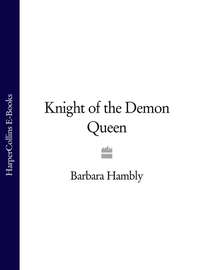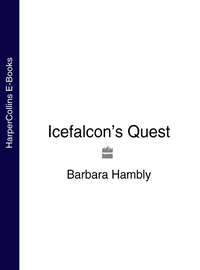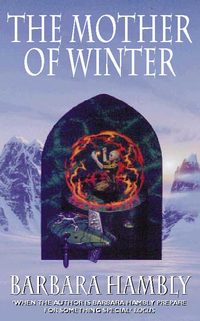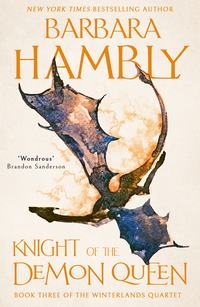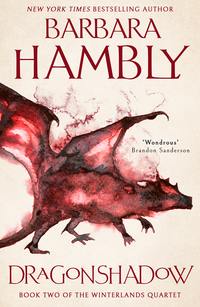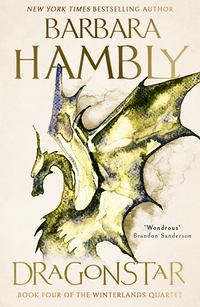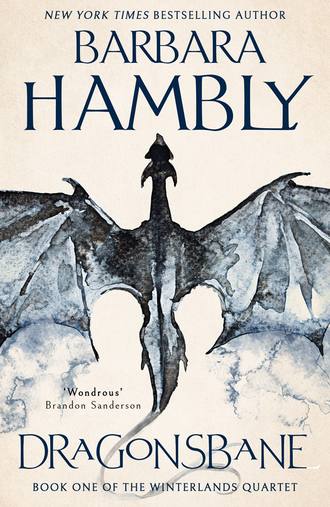
Полная версия
Dragonsbane
They broke through the door like raiders robbing Hell. A hot, damp fetor smote Jenny in the face as she barged through on John’s heels, the putrid stink of the filth the Meewinks lived in and of the decaying fish they ate—above it all was the sharp, copper-bright stench of new-shed blood. The noise was a pandemonium of yammering screams; after the darkness outside, even the smoky glow of the fire in the unnaturally huge hearth seemed blinding. Bodies seethed in a heaving mob around the small door at the opposite side of the room; now and then sharp flashes of light glinted from the knives clutched in moist little hands.
Gareth was backed to the doorpost in the midst of the mob. He had evidently fought his way that far but knew if he descended into the more open space of the big room he would be surrounded. His left arm was wrapped, shieldlike, in a muffling tangle of stained and filthy bedding; in his right hand was his belt, the buckle-end of which he was using to slash at the faces of the Meewinks all around him. His own face was streaming with blood from knife-cuts and bites—mixed with sweat, it ran down and encrimsoned his shirt as if his throat had been cut. His naked gray eyes were wide with a look of sickened, nightmare horror.
The Meewinks around him were gibbering like the souls of the damned. There must have been fifty of them, all armed with their little knives of steel, or of sharpened shell. As John and Jenny broke in, Jenny saw one of them crawl in close to Gareth and slash at the back of his knee. His thighs were already gashed with a dozen such attempts, his boots sticky with runnels of blood; he kicked his attacker in the face, rolling her down a step or two into the mass of her fellows. It was the old woman he had kept John from shooting.
Without a word, John plunged down into the heaving, stinking mob. Jenny sprang after him, guarding his back; blood splattered her from the first swing of his sword, and around them the noise rose like the redoubling of a storm at sea. The Meewinks were a small folk, though some of the men were as tall as she; it made her cringe inside to cut at the slack white faces of people no bigger than children and to slam the weighted butt of the halberd into those pouchy little stomachs and watch them fall, gasping, vomiting, and choking. But there were so many of them. She had kilted her faded plaid skirts up to her knees to fight and she felt hands snatch and drag at them, as one man caught up a cleaver from among the butcher’s things lying on the room’s big table, trying to cripple her. Her blade caught him high on the cheekbone and opened his face down to the opposite corner of his jaw. His scream ripped the cut wider. The stench of blood was everywhere.
It seemed to take only seconds to cross the room. Jenny yelled, “Gareth!” but he swung at her with the belt—she was short enough to be a Meewink, and he had lost his spectacles. She flung up the halberd; the belt wrapped itself around the shaft, and she wrenched it from his hands. “It’s Jenny!” she shouted, as John’s sword strokes came down, defending them both as it splattered them with flying droplets of gore. She grabbed the boy’s bony wrist, jerking him down the steps into the room. “Now, run!”
“But we can’t …” he began, looking back at John, and she shoved him violently in the direction of the door. After what appeared to be a momentary struggle with a desire not to seem a coward by abandoning his rescuers, Gareth ran. They passed the table and he caught up a meat hook in passing, swinging at the pallid, puffy faces all around them and at the little hands with their jabbing knives. Three Meewinks were guarding the door, but fell back screaming before the greater length of Jenny’s weapon. Behind her, she could hear the squeaky cacophony around John rising to a crescendo; she knew he was outnumbered, and her instincts to rush back to fight at his side dragged at her like wet rope. It was all she could do to force herself to hurl open the door and drag Gareth at a run across the clearing outside.
Gareth balked, panicky. “Where are the horses? How are we …?”
For all her small size, she was strong; her shove nearly toppled him. “Don’t ask questions!” Already small, slumped forms were running about the darkness of the woods ahead. The ooze underfoot soaked through her boots as she hauled Gareth toward where she, at least, could see the three horses, and she heard Gareth gulp when they got close enough for the spells to lose their effectiveness.
While the boy scrambled up to Battlehammer’s back, Jenny flung herself onto Moon Horse, caught Osprey’s lead-rein, and spurred back toward the house in a porridgey spatter of mud. Pitching her voice to cut through the screaming clamor within, she called out, “JOHN!” A moment later a confused tangle of figures erupted through the low doorway, like a pack of dogs trying to bring down a bear. The white glare of the witchlight showed Aversin’s sword bloody to the pommel, his face streaked and running with his own blood and that of his attackers, his breath pouring like a ribbon of steam from his mouth. Meewinks clung to his arms and his belt, hacking and chewing at the leather of his boots.
With a screaming battle cry like a gull’s, Jenny rode down upon them, swinging her halberd like a scythe. Meewinks scattered, mewing and hissing, and John wrenched himself free of the last of them and flung himself up to Osprey’s saddle. A tiny Meewink child hurled up after him, clinging to the stirrup leather and jabbing with its little shell knife at his groin; John swung his arm downward and caught the child across its narrow temple with the spikes of his armband, sweeping it off as he would have swept a rat.
Jenny wheeled her horse sharply, spurring back to where Gareth still clung to Battlehammer’s saddle on the edge of the clearing. With the precision of circus riders, she and John split to grab the big gelding’s reins, one on either side, and, with Gareth in tow between them, plunged back into the night.
“There.” Aversin dipped one finger into a puddle of rainwater and flicked a droplet onto the iron griddle balanced over the fire. Satisfied with the sizzle, he patted cornmeal into a cake and dropped it into place. Then he glanced across at Gareth, who was struggling not to cry out as Jenny poured a scouring concoction of marigold-simple into his wounds. “Now you can say you’ve seen Aversin the Dragonsbane run like hell from a troop of forty four-foot-tall septuagenarians.” His bitten, bandaged hands patted another cake into shape, and the dawn grayness flashed off his specs as he grinned.
“Will they be after us?” Gareth asked faintly.
“I doubt it.” He picked a fleck of cornmeal off the spikes of his armbands. “They’ll have enough of their own dead to keep them fed awhile.”
The boy swallowed queasily, though having seen the instruments laid out on the table in the Meewinks’ house, there could be little doubt what they had meant for him.
At Jenny’s insistence, after the rescue, they had shifted their camp away from the garnered darkness of the woods. Dawn had found them in relatively open ground on the formless verges of a marsh, where long wastes of ice-scummed, standing water reflected a steely sky among the black pen strokes of a thousand reeds. Jenny had worked, cold and weary, to lay spells about the camp, then had occupied herself with the contents of her medicine satchel, leaving John, somewhat against her better judgment, to make breakfast. Gareth had dug into his packs for the bent and battered spectacles that had survived the fight in the ruins up north, and they perched forlornly askew now on the end of his nose.
“They were always a little folk,” John went on, coming over to the packs where the boy sat, letting Jenny finish binding up his slashed knees. “After the King’s troops left the Winterlands, their villages were forever being raided by bandits, who’d steal whatever food they raised. They never were a match for an armored man, but a village of ’em could pull one down—or, better still, wait till he was asleep and hack him up as he lay. In the starving times, a bandit’s horse could feed a whole village for a week. I expect it started out as only the horses.”
Gareth swallowed again and looked as if he were going to be ill.
John put his hands through his metal-plated belt. “They generally strike right before dawn, when sleep is deepest—it’s why I switched the watches, so I’d be the one they dealt with, instead of you. It was a Whisperer that got you away from the camp, wasn’t it?”
“I—I suppose so.” He looked at the ground, a shadow crossing his thin face. “I don’t know. It was something …” Jenny felt him shudder.
“I’ve seen them on my watch, once or twice … Jen?”
“Once.” Jenny spoke shortly, hating the memory of those crying shapes in the darkness.
“They take all forms,” John said, sitting on the ground beside her and wrapping his arms about his knees. “One night one even took Jen’s, with her lying beside me … Polyborus says in his Analects—or maybe it’s in that half-signature of Terens’ Of Ghosts—that they read your dreams and take on the forms that they see there. From Terens—or is it Polyborus? Or maybe it’s in Clivy, though it’s a bit accurate for Clivy—I get the impression they used to be much rarer than they are now, whatever they are.”
“I don’t know,” Gareth said quietly. “They must have been, because I’d never heard of them, or of the Meewinks, either. After it—it lured me into the woods, it attacked me. I ran, but I couldn’t seem to find the camp again. I ran and ran … and then I saw the light from that house …” He fell silent again with a shudder.
Jenny finished wrapping Gareth’s knee. The wounds weren’t deep, but, like those on John’s face and hands, they were vicious, not only the knife cuts, but the small, crescent-shaped tears of human teeth. Her own body bore them, too, and experience had taught her that such wounds were filthier than poisoned arrows. For the rest, she was aching and stiff with pulled muscles and the general fatigue of battle, something she supposed Gareth’s ballads neglected to mention as the inevitable result of physical combat. She felt cold inside, too, as she did when she worked the death-spells, something else they never mentioned in ballads, where all killing was done with serene and noble confidence. She had taken the lives of at least four human beings last night, she knew, for all that they had been born and raised into a cannibal tribe; had maimed others who would either die when their wounds turned septic in that atmosphere of festering decay, or would be killed by their brothers.
To survive in the Winterlands, she had become a very competent killer. But the longer she was a healer, the more she learned about magic and about life from which all magic stemmed, the more she loathed what she did. Living in the Winterlands, she had seen what death did to those who dealt it out too casually.
The gray waters of the marsh began to brighten with the remote shine of daybreak beyond the clouds. With a soft winnowing of a thousand wings, the wild geese rose from the black cattail beds, seeking again the roads of the colorless sky. Jenny sighed, weary to her bones and knowing that they could not afford to rest—knowing that she would have no rest until they crossed the great river Wildspae and entered the lands of Belmarie.
Quietly, Gareth said, “Aversin—Lord John—I—I’m sorry. I didn’t understand about the Winterlands.” He looked up, his gray eyes tired and unhappy behind their cracked specs. “And I didn’t understand about you. I—I hated you, for not being what—what I thought you should be.”
“Oh, aye, I knew that,” John said with a fleet grin. “But what you felt about me was none of my business. My business was to see you safe in a land you had no knowledge of. And as for being what you expected—Well, you can only know what you know, and all you knew were those songs. I mean, it’s like Polyborus and Clivy and those others. I know bears aren’t born completely shapeless for their mothers to sculpt with their tongues, like Clivy says, because I’ve seen newborn bear cubs. But for all I know, lions may be born dead, although personally I don’t think it’s likely.”
“They aren’t,” Gareth said. “Father had a lioness once as a pet, when I was very little—her cubs were born live, just like big kittens. They were spotted.”
“Really?” Aversin looked genuinely pleased for one more bit of knowledge to add to the lumber room of his mind. “I’m not saying Dragonsbanes aren’t heroic, because Selkythar and Antara Warlady and the others might have been, and may have gone about it all with swords in golden armor and plumes. It’s just that I know I’m not. If I’d had a choice, I’d never have gone near the bloody dragon, but nobody asked me.” He grinned and added, “I’m sorry you were disappointed.”
Gareth grinned back. “I suppose it had to rain on my birthday sometime,” he said, a little shyly. Then he hesitated, as if struggling against some inner constraint. “Aversin, listen,” he stammered. Then he coughed as the wind shifted, and smoke swept over them all.
“God’s Grandmother, it’s the bloody cakes!” John swore and dashed back to the fire, cursing awesomely. “Jen, it isn’t my fault …”
“It is.” Jenny walked in a more leisurely manner to join him, in time to help him pick the last pitiful black lump from the griddle and toss it into the waters of the marsh with a milky plash. “I should have known better than to trust you with this. Now go tend the horses and let me do what you brought me along to do.” She picked up the bowl of meal. Though she kept her face stern, the touch of her eyes upon his was like a kiss.
FOUR

IN THE DAYS that followed, Jenny was interested to notice the change in Gareth’s attitude toward her and toward John. For the most part he seemed to return to the confiding friendliness he had shown her after she had rescued him from the bandits among the ruins, before he had learned that she was his hero’s mistress, but it was not quite the same. It alternated with a growing nervousness and with odd, struggling silences in his conversation. If he had lied about something at the Hold, Jenny thought, he was regretting it now—but not regretting it enough yet to confess the truth.
Whatever the truth was, she felt that she came close to learning it the day after the rescue from the Meewinks. John had ridden ahead to scout the ruinous stone bridge that spanned the torrent of the Snake River, leaving them alone with the spare horses and mules in the louring silence of the winter woods. “Are the Whisperers real?” he asked her softly, glancing over his shoulder as if he feared to see last night’s vision fading into daytime reality from the mists between the trees.
“Real enough to kill a man,” Jenny said, “if they can lure him away from his friends. Since they drink blood, they must be fleshly enough to require sustenance; but, other than that, no one knows much about them. You had a narrow escape.”
“I know,” he mumbled, looking shamefacedly down at his hands. They were bare, and chapped with cold—as well as his cloak and sword, he had lost his gloves in the house of the Meewinks; Jenny suspected that later in the winter the Meewinks would boil them and eat the leather. One of John’s old plaids was draped on over the boy’s doublet and borrowed jerkin. With his thin hair dripping with moisture down onto the lenses of his cracked spectacles, he looked very little like the young courtier who had come to the Hold.
“Jenny,” he said hesitantly, “thank you—this is the second time—for saving my life. I—I’m sorry I’ve behaved toward you as I have. It’s just that …” His voice tailed off uncertainly.
“I suspect,” said Jenny kindly, “that you had me mistaken for someone else that you know.”
Ready color flooded to the boy’s cheeks. Wind moaned through the bare trees—he startled, then turned back to her with a sigh. “The thing is, you saved my life at the risk of your own, and I endangered you both stupidly. I should have known better than to trust the Meewinks; I should never have left the camp. But …”
Jenny smiled and shook her head. The rain had ceased, and she had put back her hood, letting the wind stir in her long hair; with a touch of her heels, she urged The Stupider Roan on again, and the whole train of them moved slowly down the trail.
“It is difficult,” she said, “not to believe in the illusions of the Whisperers. Even though you know that those whom you see cannot possibly be there outside the spell-circle crying your name, there is a part of you that needs to go to them.”
“What—what shapes have you seen them take?” Gareth asked in a hushed voice.
The memory was an evil one, and it was a moment before Jenny answered. Then she said, “My sons. Ian and Adric.” The vision had been so real that even calling their images in Caerdinn’s scrying-crystal to make sure that they were safe at the Hold had not entirely banished her fears for them from her mind. After a moment’s thought she added, “They have an uncanny way of taking the shape that most troubles you; of knowing, not only your love, but your guilt and your longing.”
Gareth flinched at that, and looked away. They rode on in silence for a few moments; then he asked, “How do they know?”
She shook her head. “Perhaps they do read your dreams. Perhaps they are themselves only mirrors and, like mirrors, have no knowledge of what they reflect. The spells we lay upon them cannot be binding because we do not know their essence.”
He frowned at her, puzzled. “Their what?”
“Their essence—their inner being.” She drew rein just above a long, flooded dip in the road where water lay among the trees like a shining snake. “Who are you, Gareth of Magloshaldon?”
He startled at that, and for an instant she saw fright and guilt in his gray eyes. He stammered, “I—I’m Gareth of—of Magloshaldon. It’s a province of Belmarie …”
Her eyes sought his and held them in the gray shadows of the trees. “And if you were not of that province, would you still be Gareth?”
“Er—yes. Of course. I …”
“And if you were not Gareth?” she pressed him, holding his gaze and mind locked with her own. “Would you still be you? If you were crippled, or old—if you became a leper, or lost your manhood—who would you be then?”
“I don’t know—”
“You know.”
“Stop it!” He tried to look away and could not. Her grip upon him tightened, as she probed at his mind, showing him it through her eyes: a vivid kaleidoscope of the borrowed images of a thousand ballads, burning with the overwhelming physical desires of the adolescent; the raw wounds left by some bitter betrayal, and over all, the shadowing darkness of a scarcely bearable guilt and fear.
She probed at that darkness—the lies he had told her and John at the Hold, and some greater guilt besides. A true crime, she wondered, or only that which seemed one to him? Gareth cried, “Stop it!” again, and she heard the despair and terror in his voice; for a moment, through his eyes, she saw herself—pitiless blue eyes in a face like a white wedge of bone between the cloud-dark streams of her hair. She remembered when Caerdinn had done this same thing to her, and released Gareth quickly. He turned away, covering his face, his whole body shivering with shock and fright.
After a moment Jenny said softly, “I’m sorry. But this is the inner heart of magic, the way all spells work—with the essence, the true name. It is true of the Whisperers and of the greatest of mages as well.”
She clucked to the horses and they started forward again, their hooves sinking squishily into the tea-colored ooze. She went on, “All you can do is ask yourself if it is reasonable that those you see would be there in the woods, calling to you.”
“But that’s just it,” said Gareth. “It was reasonable. Zyerne …” He stopped himself.
“Zyerne?” It was the name he had muttered in his dreams at the Hold, when he had flinched aside from her touch.
“The Lady Zyerne,” he said hesitantly. “The—the King’s mistress.” Under its streaking of rain and mud his face was bright carnation pink. Jenny remembered her strange and cloudy dream of the dark-haired woman and her tinkling laughter.
“And you love her?”
Gareth blushed even redder. In a stifled voice he repeated, “She is the King’s mistress.”
As I am John’s, Jenny thought, suddenly realizing whence his anger at her had stemmed.
“In any case,” Gareth went on after a moment, “we’re all in love with her. That is—she’s the first lady of the Court, the most beautiful … We write sonnets to her beauty …”
“Does she love you?” inquired Jenny, and Gareth fell silent for a time, concentrating on urging his horse through the mud and up the stony slope beyond.
At length he said, “I—I don’t know. Sometimes I think …” Then he shook his head. “She frightens me,” he admitted. “And yet—she’s a witch, you see.”
“Yes,” said Jenny softly. “I guessed that, from what you said at the Hold. You feared I would be like her.”
He looked stricken, as if caught in some horrible social gaffe. “But—but you’re not. She’s very beautiful …” He broke off, blushing in earnest, and Jenny laughed.
“Don’t worry. I learned a long time ago what a mirror was for.”
“But you are beautiful,” he insisted. “That is—Beautiful isn’t the right word.”
“No.” Jenny smiled. “I do think ‘ugly’ is the word you’re looking for.”
Gareth shook his head stubbornly, his honesty forbidding him to call her beautiful and his inexperience making it impossible to express what he did mean. “Beauty—beauty really doesn’t have anything to do with it,” he said at last. “And she’s nothing like you—for all her beauty, she’s crafty and hard-hearted and cares for nothing save the pursuit of her powers.”
“Then she is like me,” said Jenny. “For I am crafty—skilled in my crafts, such as they are—and I have been called hard-hearted since I was a little girl and chose to sit staring at the flame of a candle until the pictures came, rather than play at house with the other little girls. And as for the rest …” She sighed. “The key to magic is magic; to be a mage you must be a mage. My old master used to say that. The pursuit of your power takes all that you have, if you will be great—it leaves neither time, nor energy, for anything else. We are born with the seeds of power in us and driven to be what we are by a hunger that knows no slaking. Knowledge—power—to know what songs the stars sing; to center all the forces of creation upon a rune drawn in the air—we can never give over the seeking of it. It is the stuff of loneliness, Gareth.”
Конец ознакомительного фрагмента.
Текст предоставлен ООО «ЛитРес».
Прочитайте эту книгу целиком, купив полную легальную версию на ЛитРес.
Безопасно оплатить книгу можно банковской картой Visa, MasterCard, Maestro, со счета мобильного телефона, с платежного терминала, в салоне МТС или Связной, через PayPal, WebMoney, Яндекс.Деньги, QIWI Кошелек, бонусными картами или другим удобным Вам способом.


